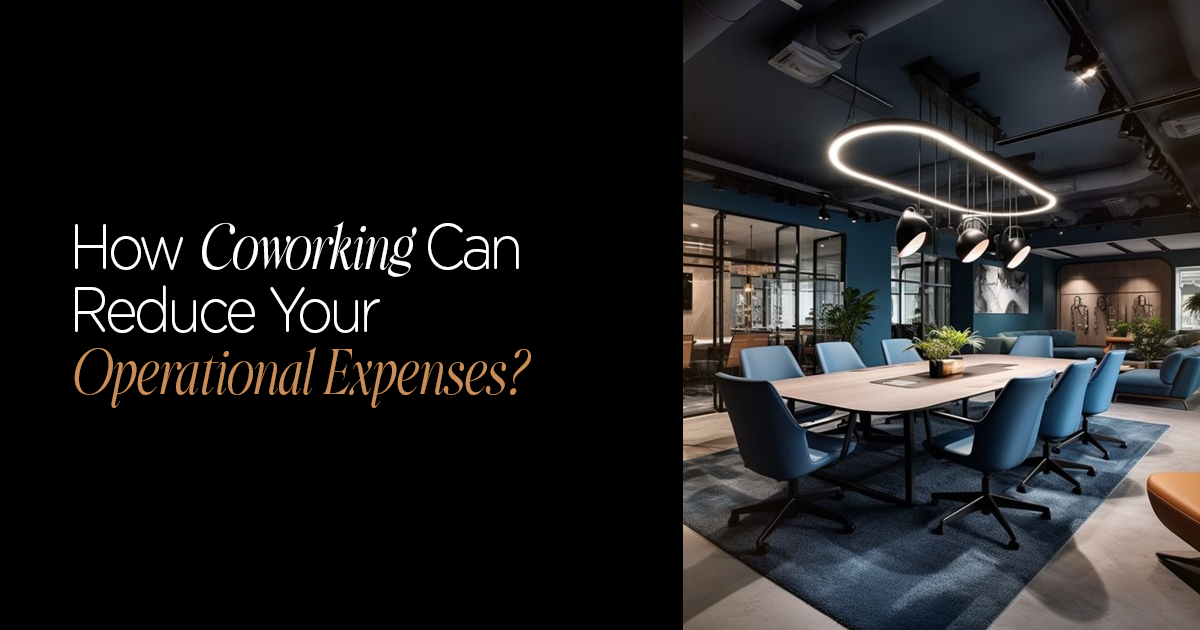
May 20, 2025
How Coworking Can Reduce Your Operational Expenses
Companies are constantly seeking ways to streamline operations and reduce costs. Many are turning to coworking spaces and managed office space, with studies showing that these options can help businesses save up to 60% on workspace expenses. Flexible workspaces help businesses save more than just rent by cutting out the need for furniture, long-term leases and maintenance. Shared amenities, easy scalability and a collaborative environment also support productivity and employee engagement.
How Managed Spaces Help Cut Costs
Shared Amenities and Infrastructure
Coworking spaces provide access to fully-equipped work environments including:Furniture and Equipment
Traditional office setups require substantial upfront investments in furniture, workstations, and equipment. Coworking spaces eliminate these furniture and equipment expenses:- Companies no longer have to spend a substantial amount on furniture and equipment.
- Businesses gain access to high-end equipment, like printers, scanners, and AV technology, without purchasing it.
- Maintenance expenses for office equipment are significantly reduced.
- Companies no longer need storage space for outdated or unused equipment.
Utilities
The costs of utilities add up quickly in traditional office settings, typically accounting for approximately 5 -10% of operational expenses. Shared utilities provide these cost advantages:- All utilities are bundled into one predictable monthly fee
- No unexpected utility bills or seasonal fluctuations
- Professional maintenance and repairs included
- Lower per-person utility costs through economies of scale
- Reduced environmental footprint through shared resources
Meeting Rooms and Breakout Spaces
Dedicated conference rooms and collaborative spaces are essential for focused discussions, client meetings and team collaboration. Here's how shared meeting spaces outperform dedicated rooms:- The pay-for-use model eliminates the costs of unused space
- Access to various room sizes for different meeting needs
- No maintenance costs for these specialised spaces
- Professional-grade technology and amenities included such as video-conferencing tools, presentation screens and whiteboards
- Flexibility to book only when needed
Reception and Administrative Support
Reception plays an important role in managing calls, greeting visitors and supporting daily tasks. Reception services in coworking spaces reduce staffing costs through:- No additional costs for benefits, training, or management
- Professional reception services are included in the membership
- Mail handling and package acceptance services included
- Basic administrative support without hiring dedicated staff
Cost-Effective Workspace Solutions
Coworking and managed offices help cut costs by including essentials like furniture, internet, and meeting rooms. Businesses benefit from:Lower Lease Cost
Traditional office leases typically require long-term commitments, creating financial inflexibility and risk. Flexible leasing offered by coworking spaces creates these financial advantages:- 15-40% reduction in direct lease costs compared to traditional offices
- No long-term lease commitments (typically 3-5 years)
- Reduced legal fees associated with complex lease negotiations
Reduced Real Estate Footprint
Shared spaces save on space which translates directly to financial savings through:- Reduction from 150-250 sq ft per employee to 60-100 sq ft
- Direct correlation between reduced square footage and lower costs
- Ability to scale space up or down as needed
- No costs for unused space during business contractions
- Immediate access to additional space during growth periods
Predictable Budgeting
Traditional offices come with numerous variable costs that complicate budgeting and financial planning. Fixed costs in shared spaces lead to these budgeting improvements:- All-inclusive pricing models simplify financial planning
- Bundled costs for rent, utilities, internet, and common areas
- Elimination of unexpected maintenance expenses
- Reduced administrative overhead for vendor management
- Simplified accounting with fewer monthly payments
Other Benefits
In addition to cost savings, coworking and managed offices provide advantages such as:Networking and Collaboration
The collaborative nature of coworking spaces creates valuable networking opportunities. Shared spaces create business growth opportunities through:- Organic connections with potential clients and partners
- Free community events and networking sessions
- Knowledge-sharing opportunities with other professionals
- Potential for collaborative projects and joint ventures
- Access to diverse skill sets and perspectives
Increased Productivity
Research shows that well-designed coworking spaces can boost productivity significantly. Coworking spaces increase efficiency in these ways:- Environments designed for various work styles and tasks
- Reduced distractions compared to working from home
- A professional atmosphere that fosters focus
- Work-life boundaries that reduce burnout and turnover
Reduced Commuting Costs
Many coworking providers operate in multiple locations across cities or regions, which offer:- Significant reduction in commuting times and associated costs
- Reduced commute-related stress and fatigue
Focus on Core Business Activities
Coworking allows businesses to focus on their core activities rather than office management. Outsourced facility management improves operations by:- Elimination of time spent on facility management
- No need to coordinate repairs or maintenance
- Reduced vendor relationship management
- Fewer operational distractions for leadership
- More time for revenue-generating activities




